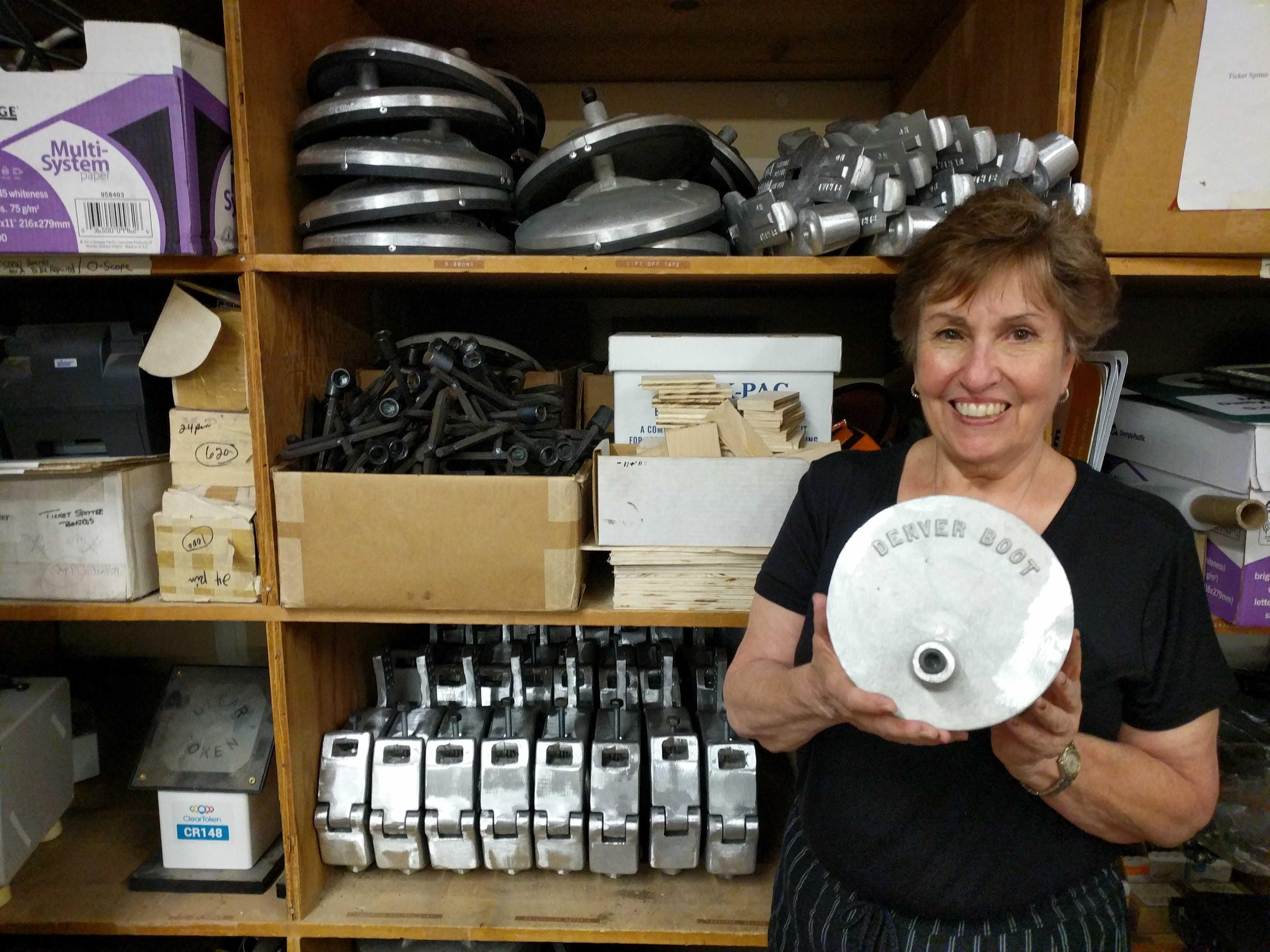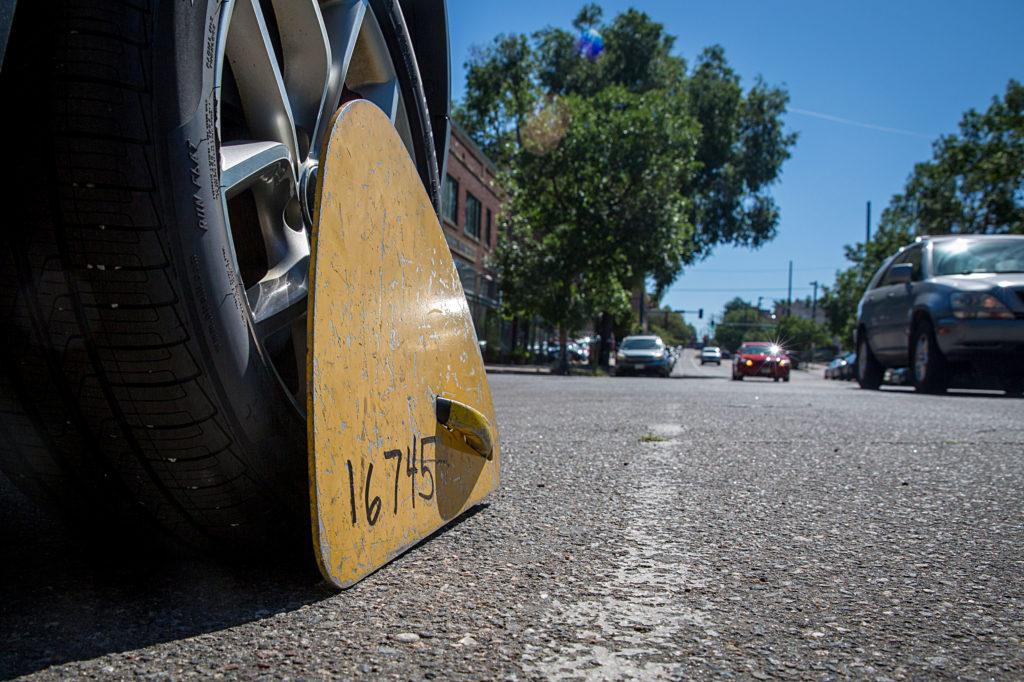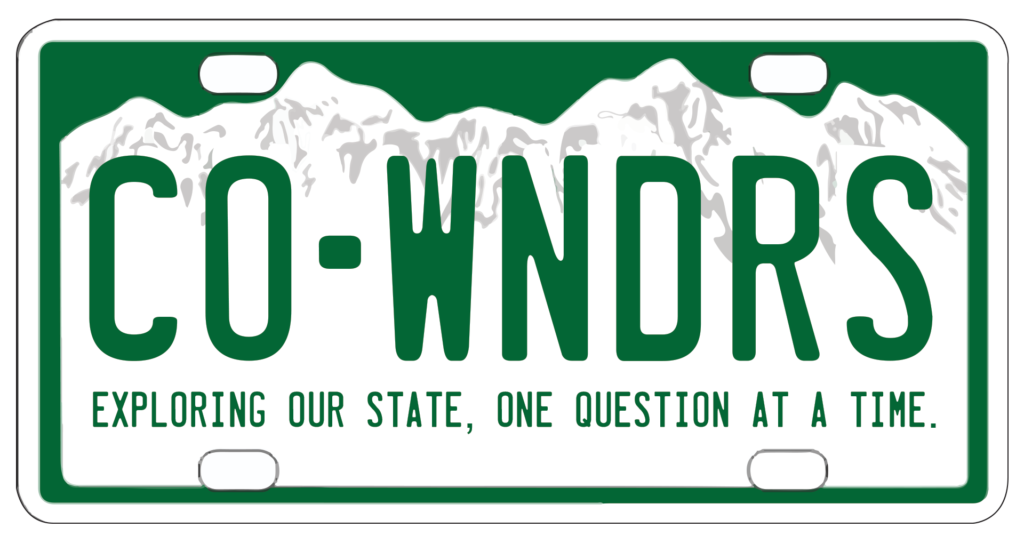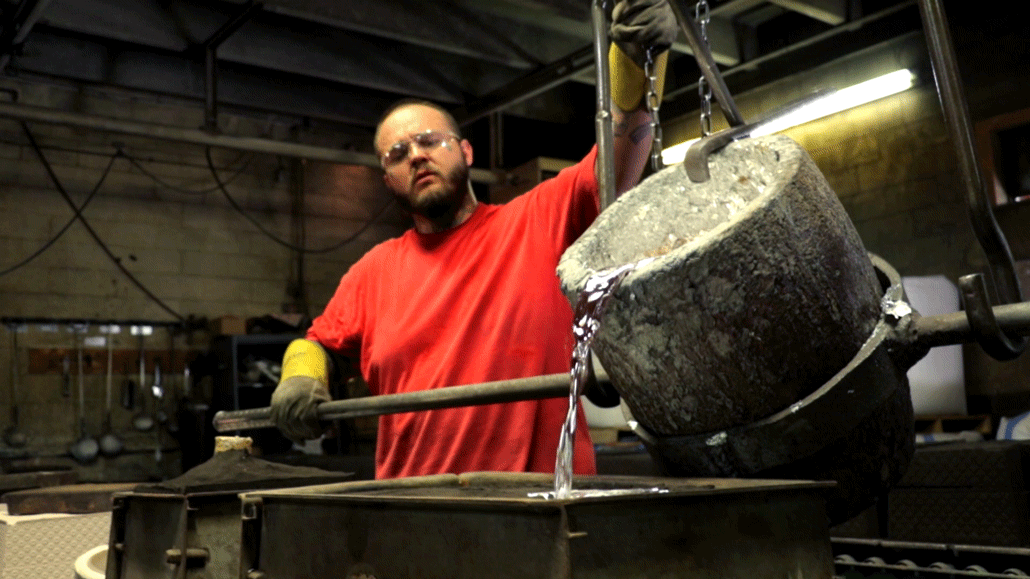
Fox Maikovich will tell you he parked in the wrong lot.
He made his fateful choice in the summer of 2017. Maikovich had an internship in Boulder ahead of his senior year at The University of Colorado. On a break, he ran back to his apartment a few blocks from campus to retrieve some Rockies tickets. He found construction blocking his parking lot, so he parked at Spanish Towers, a neighboring apartment complex.
“For just like a five-minute trip in and out, I thought I was going to be completely fine,” he recalled.
But when he returned, he found possibly the most hated invention ever to come from Colorado: a car boot. The wheel clamp was strapped to his Ford Windstar, making it impossible for him to drive back to work.
A yellow notice on the window gave him a number to call. Once he did, a man arrived in a weathered sedan reading Colorado Parking Services. He collected a $123 fee through an iPhone card reader, removed the boot and drove off.
This sort of enforcement scheme is common across Colorado.
For decades, cities and other public authorities have relied on car boots to force the payment of delinquent parking tickets. It’s also become a common tool in the private sector, helping strip malls, private lots and apartment complexes police their property — much to the frustration of drivers.
While many states have regulated or even outlawed private booting, Colorado largely remains the Wild West for booters. That’s set to change thanks to a law the legislature passed earlier in 2019, which orders the Public Utilities Commission to regulate private booting much as it already regulates private towing companies. The rules, which are still being written, are set to take effect in 2020.
All of that might not have happened if Maikovich had simply taken the financial hit and forgotten about his whole booting experience.
Instead, he called his dad.
Andy Maikovich, Fox’s father, happens to know a thing or two about legal research. As an educator for the Colorado Judicial branch, it’s his job to help train judges when laws change. So when his son told him about his booting experience, the senior Maikovich put those skills to use. Immediately, he zeroed in on the price.
“The thing that hit me what was, ‘$123 seems kinda high for a car that hasn’t been moved.’”
Digging into state regulations, Maikovich found the Public Utilities Commission has put a cap on the amount a towing company can charge an illegally parked driver who gets back to their car before it’s moved. This is known as a “drop fee,” and is set at $70 for most vehicles in Colorado.
The notice stuck to Fox’s car said he’d been booted as an alternative to towing, so Maikovich figured the same limit must apply. He called Colorado Parking Services to see if he could get part of his son’s money back. He got a blunt response from the company: Booting businesses can threaten to tow, but aren’t subject to towing rules.
“At that point, I was fairly stunned,” he said.
Over the next few months, Andrew and Fox Maikovich found out the company was mostly right. The father-son duo sued Colorado Parking Services in small claims court, arguing it was subject to the PUC towing rules. The company countered that Fox admitted to parking illegally.

In the end, a Broomfield County judge awarded the Maikoviches $73, but only because the company’s contract with the apartment complex limited any fines to $50. The ruling said nothing about state regulations.
Colorado Parking Services declined to comment for this story. Hudson Real Estate Company, which manages the complex where Fox Maikovich parked, also did not reply to repeated requests for comment about its relationship with Colorado Parking Services.
Meanwhile, Andrew Maikovich sought help from state officials, sending out a detailed letter about his son’s experience and asking them to put some guardrails on the industry.
The only one he heard back from was Democratic Senate Majority Leader Steve Fenberg, who represents Boulder. Fenberg had his own frustrations with Colorado Parking Services after the company booted his wife outside of a Boulder Walgreens. She told him it cost $300 to have her car released.
“I was like, ‘That can’t be legal,’” he said. “People should be able to enforce rules in their own parking lots, but you shouldn’t be able to take someone’s car hostage and then just demand whatever ransom.”
After meeting Maikovich for coffee and learning about his research, Fenberg brought the issue to the legislature. As a part of the effort, state researchers found only Denver and Avon regulate private booters. Anywhere else in Colorado, it appeared legal for private property owners to buy a boot and start charging whatever they wanted to remove it.
Fenberg’s answer was to tuck plans for regulations into a massive bill reauthorizing the state’s Public Utilities Commission. Under the legislation, the commission will begin to license and regulate private booting companies and come up with specific rules for the industry.
Fenberg suspects many of those regulations will mirror what the PUC already has in place for private towing companies. That could include rules for signs in parking lots and standards for contracts between booters and property owners — not to mention a maximum fee to release a car.
Ultimately, he said the regulations should balance property rights and consumer protection.
“There’s a level of authority and autonomy you can have over your parking lot, but you can’t be making a profit by just taking advantage of people,” he said.
The new rules are just the latest chapter in Colorado’s long history with the wheel clamps.
Across the nation, the devices are known infamously as ‘the Denver boot.’ After noticing more and more of them in her Denver neighborhood, Jill Hamilton asked Colorado Wonders why the device is associated with the Mile High city. Was it really invented here?

The short answer is: yes.
Few know the tale better than Liz Wolfson. The Denver businesswoman and her husband, Stanley Wolfson, own and operate Clancy Systems International in South Denver. The company mainly makes electronic parking ticket systems.
It also owns the original Denver boot and the legend that comes with it.
On a recent visit, Wolfson flipped on a light in a back storage room, revealing a wall stacked with boot parts. The device is made of unpainted aluminum. Two arms hug either side of a wheel while a disc protects the lug nuts. A padlock then secures the apparatus.
“It’s feared,” Wolfson said with a prideful smile. “It’s like Dracula for cars.”
As Wolfson tells it, the story of the Denver boot begins with Frank M. Marugg, a Denver shop teacher and violinist with the Colorado Symphony.
In the 1950s, Dan Stills, a friend on the Denver Police force, told Marugg about a problem: Parking scofflaws weren’t paying their tickets. The city could force them to pay by towing a vehicle, but that often resulted in lawsuits if a car was robbed or damaged in the process.
“[Marugg] said ‘What if we could do something to get these people to pay their parking tickets? What if we could put something on the car?’” said Wolfson. “ And Frank made the boot.”
According to newspaper reports, that account may be a bit apocryphal. Marugg’s invention likely predated his conversation with Stills. In at least two articles, Marugg said he first made the device in 1944, which would make 2019 its 75 anniversary. A few years later, a placemat from Denver’s Gunther Toody’s restaurant started informing diners a rubber shortage in World War II may have been the actual impetus for the device.
But Denver was the first city to put the device to use in 1955. Stills reportedly named it after the Oregon boot, a weighted shoe jailers used to immobilizers prisoners. In just 25 days, the police collected more than $18,000 in parking tickets.
Afterward, Marugg cashed in on his success. He patented the boot in 1958 and formed a company to sell it to cities around the world. In 1986, his daughter sold the business to Clancy Systems, which still fills orders for about 250 boots each year. Other than some minor updates, the device is remarkably close to Marugg’s original invention.
The boot is also still manufactured in Colorado. At J.W. Reffel Metal Foundry in Englewood, owner Rocky Reffel regularly watches workers cast the devices. He said the business has helped keep the 82-year-old foundry alive when similar metalwork is moving overseas.

“I think it’s awesome,” he said. “It’s one of the best relationships we have with one of the longest customers we’ve had.”
Wolfson is skeptical about the boot’s future, though. Today, cities have new tools to force people to pay their tickets, like pausing someone’s license or registration. In that respect, she thinks the device is “almost a relic.”
If it’s to stay relevant, Wolfson suspects it will be in private parking lots, which usually lack those high-tech tools. That’s why she’s not surprised apartment complexes and strip malls now make up a greater portion of her wheel clamp sales. For private lot operators, Marrug’s invention remains the best way to protect their investments.
“They’re paying taxes. They’re paying their insurance,” she said. “They are selling that slot, and when they don’t get paid, it’s wrong.”
Already, one business is at work reinventing the wheel clamp.
Joel Perri, owner of ParkItRight LLC, knows his work as a booter isn’t popular. Still, he said private parking enforcement is a necessary service, especially with all the continued growth on the Front Range. And while paying for a boot removal might stink, he argues it’s a whole lot better than a tow.
“People view booting as a gutter-type industry,” said Perri. “I always saw that as an opportunity for me to do better.”
Perri claims the plan for his booting business came to him in a dream. In 2015, he was in the middle of selling his Denver towing business to his partner. As he slept, he imagined what he calls a “remote-release boot.” The device would attach to someone’s car like any other wheel clamp, but a driver could detach it themselves after paying a fee over the phone.
The result is a triangular wheel clamp of Perri’s own invention. Drivers can remove it themselves, once they call ParkitRight to pay a fee and get a code for the lock. It’s the lynchpin of his business, which operates as a family affair.
Each night, Perri loads into a sprinter van with his wife Shelly, and their grown daughter, Bethany. It's not glamorous work. The family patrols from about 9 pm to 2 a.m., visiting 30 to 40 apartment complexes around Metro Denver.
Everything involved is colored bright green, from the van to the uniforms to actual boots. Perri said the goal is to be as visible and professional as possible, as a warning to potential scofflaws.
“We want people to see us,” he explained. “So when somebody comes onto our property, they see a car booted, they're going to not park that way. They're going to try to park properly.”
Perri worries upcoming state regulations will only hurt businesses like his, which already try to avoid less savory booting practices. He’s opposed to so-called “hitter lots,” where a booter just sits at a property and waits for violators. Perri also refuses to share kickbacks with property owners.
Then there’s the question of cost. To remove a ParkItRight boot, customers have to pay $350 upfront but get $165 back once they return the boot to a kiosk at each property.
“The market is always the corrector,” he said. “I’m not going to charge as much as a tow because I’m not incurring the same expenses.”
But Sen. Majority Leader Steve Fenberg, who pushed the new regulations, said that argument doesn’t apply to an industry like booting. In other markets, competitors would have a chance to undercut Perri’s price. When a car is locked up, a driver doesn’t really have a choice other than to accept the terms and pay.
“That’s where we — the government — has a role to step in and set some basic standards,” Fenberg said.
The Public Utility Commission is now working on proposed rules to present for public comment, which it plans to discuss at an upcoming meeting on Sept. 11. The regulations should take effect at the start of 2020.
After that, it’s anyone’s guess if Colorado can clamp down on its most dreaded invention.
Are you curious about something in the Centennial State? Ask us a question via Colorado Wonders and we’ll try to find the answer.









